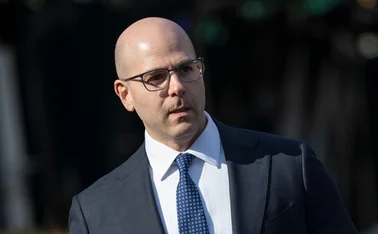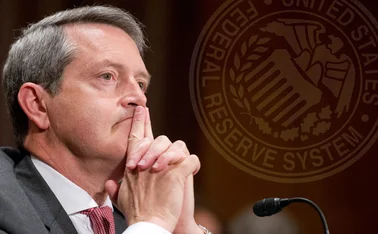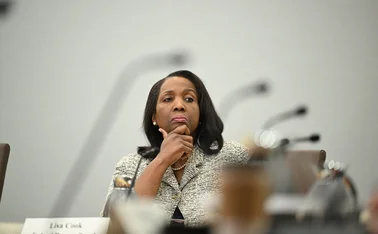
Ukrainian central bank attacks arrest of former deputy governor
Arrest is “absurd” and aims to send a message to reformers, Gontareva says

Ukrainian anti-corruption police have arrested current and former central bank officials, including an ex-first deputy governor, in connection with its refinancing of a lender in 2014.
Oleksandr Pysaruk, who as first deputy governor played a leading role in the central bank’s reforms of the country’s banking sector, was arrested by Ukraine’s national anti-corruption bureau (Nabu), on November 11. Nabu said it had arrested Pysaruk and six others on suspicion of embezzling a central bank stabilisation loan worth 1.2 billion hryvnia (now approximately $49 million).
The arrests brought a furious response from the central bank, which issued a statement saying “Oleksandr Pysaruk is a professional banker with an impeccable reputation”. The National Bank of Ukraine said that “together with the first post-revolutionary central bank management team, he was at the forefront of banking sector reform, through which we now have healthy, transparent and reliable banks”.
NBU governor Yakiv Smolii interrupted a business trip on hearing of the arrests and returned to Ukraine. The NBU said it was “angered” by the arrests, statements strongly echoed by the ex-governor of the central bank who employed Pysaruk.
Valeria Gontareva told Central Banking today (November 12) that Pysaruk’s arrest was “absurd”, and due to either corruption or “stupidity” on the part of the police. “I hope it’s due to stupidity, because corruption will be much harder to deal with,” said Gontareva.
The police will have to bring the arrested people before a court, which can either release them on bail or authorise their detention for a period of several weeks, one observer said.
The anti-corruption agency said that “current central bank officials” were also among those arrested, but gave no details. The arrests relate to a loan that was advanced to VAB Bank, one of dozens of Ukrainian lenders that were granted state funds in 2014.
“A perfect storm”
Gontareva said the NBU had re-financed VAB Bank in September 2014 with only enough funds necessary to enable it to pay out insured private deposits. “In 2014, it was a perfect storm in the banking sector, as war had just broken out,” she said today. “We had to make sure depositors got their money, or there would have been panic.”
There was a wave of bank failures after fighting broke out in Ukraine’s eastern regions with Russian-backed separatists. Gontareva said the failed banks had held 30% of private individual deposits, meant to be covered by the state guarantee fund.
She said the central bank had moved rapidly to reform resolution procedures, and had introduced external valuations of banks’ assets in 2015. But she said that in 2014, the NBU’s priorities had been to ensure that depositors had access to state-guaranteed funds while also dealing with a massive currency crisis and financing the country’s war effort.
Gontareva said the central bank had immediately placed VAB Bank in resolution, along with dozens of others. In total, 89 banks were shuttered by the central bank from 2014–17 under Gontareva’s leadership.
The former governor said that she and Pysaruk had insisted that all owners of recapitalised banks sign a personal guarantee that they were liable for the state funds. VAB Bank’s owner Oleg Bakhmatyuk had signed these guarantees but had then successfully challenged them in the Ukrainian courts, she said.
Gontareva said that none of the recapitalised Ukrainian banks had ever repaid the state funds advanced to cover deposit guarantees.
She said she had made several public speeches, including her final statement to Ukraine’s parliament, alleging Bakhmatyuk was one of several former bank owners who still owed billions of hryvnia to the Ukrainian state. Most of these loans had been made by the central bank before she became governor in June 2014, she said.
Gontareva said Pysaruk’s signature, rather than hers, was on the documents authorising VAB Bank’s refinancing only because she had been visiting the International Monetary Fund in Washington, DC, at the time.

The National Bank of Ukraine released a statement today saying that no serving members of the central bank’s board or any of its department heads had been arrested. The NBU pointedly illustrated its press release with a picture of Smolii sitting at a board meeting several years ago next to both Pysaruk and Gontareva.
Smolii and Gontareva have repeatedly alleged this year that there is a deliberate campaign to overturn the reforms of the banking sector. They have said that politically well-connected businessmen are waging this campaign against former and current central bank officials.
Gontareva has said that oligarchs who lost their banks under former president Petro Poroshenko have become emboldened since the election of Volodymyr Zelensky in May. She has said the burning down of her family house and her son’s car, and an armed raid on her Kyiv flat, were all part of this campaign.
She has repeatedly alleged that Ihor Kolomoisky, former joint owner of Ukraine’s largest lender PrivatBank, is one of the leading figures behind the campaign. PrivatBank was nationalised in December 2016 on the central bank’s recommendation. Kolomoisky has not responded to requests for comment from Central Banking.
Pisaryuk became deputy governor of the National Bank of Ukraine in July 2014, leaving his job with commercial bank ING in Amsterdam at Gontareva’s request. Gontareva said Pisaryuk was the one person she had specifically asked to join the NBU when she became governor. “He is perhaps the best banker and the most honest man I have ever met,” she told Central Banking.
Pysaruk is now chairman of the Ukrainian subsidiary of the Austria-based bank Raiffeisen Bank Aval, the largest foreign-owned lender in the country. After leaving the central bank in 2015, he served for three years as a senior IMF official.
His arrest is likely to have international consequences for president Zelensky’s government, Gontareva said. “The next IMF mission arrives in Ukraine soon. Pysaruk is one of their former officials and they know how honest he is. They will not be happy that he has been arrested.”
The IMF’s previous managing director, Christine Lagarde, issued repeated public warnings that the fund would withhold aid to Ukraine unless the government supported economic reformers. In September, the IMF again warned the government to protect central bank independence and economic reforms.
Failure to prosecute
Gontareva said Ukraine’s police had failed to prosecute a single owner or senior manager at any of Ukraine’s banks over the last five years, despite what she said was massive fraud in the sector.
She told Central Banking that in 2017, after she had resigned as central bank governor, the anti-corruption police began investigating the refinancing of VAB Bank. “I tried to explain to Nabu what we had done with VAB Bank, and central bank officials did the same,” she said. “I thought that was enough. Nabu did not have a very sophisticated understanding of finance.”
But Gontareva said the police actions might also be due to corruption, with Pysaruk’s arrest intended to send a signal to financial reformers. She said that the police could have interviewed Pysaruk in his office but had arrested him publicly instead. “They put on a show. What is the purpose of this? I think it’s to intimidate reformers.”
Further moves likely
Gontareva warned there were likely to be further moves against central bank officials. “Yesterday it was me being targeted, today it is Pysaruk, and tomorrow it will probably be Kateryna Rozhkova,” she said. “The position Rozhkova holds is the same as the one Pysaruk did: first deputy governor in charge of the banking sector.”
A Ukrainian lawmaker brought a legal action preventing Rozhkova from carrying out her central bank duties earlier this year, but the lawsuit was overturned by an appeals court.
“The NBU is concerned that courts are becoming an instrument of coercion and pressure in the hands of rogue politicians who seek to thwart the NBU’s operation,” said Viktor Hryhorchuk, head of litigation at the NBU, in a statement issued at the time. “These circumstances have once again highlighted the need to complete the reform of the judiciary in order to rule out situations in which corrupt individuals can use courts to exert political pressure on government authorities.”
Further reading
Only users who have a paid subscription or are part of a corporate subscription are able to print or copy content.
To access these options, along with all other subscription benefits, please contact info@centralbanking.com or view our subscription options here: www.centralbanking.com/subscriptions
You are currently unable to print this content. Please contact info@centralbanking.com to find out more.
You are currently unable to copy this content. Please contact info@centralbanking.com to find out more.
Copyright Infopro Digital Limited. All rights reserved.
As outlined in our terms and conditions, https://www.infopro-digital.com/terms-and-conditions/subscriptions/ (point 2.4), printing is limited to a single copy.
If you would like to purchase additional rights please email info@centralbanking.com
Copyright Infopro Digital Limited. All rights reserved.
You may share this content using our article tools. As outlined in our terms and conditions, https://www.infopro-digital.com/terms-and-conditions/subscriptions/ (clause 2.4), an Authorised User may only make one copy of the materials for their own personal use. You must also comply with the restrictions in clause 2.5.
If you would like to purchase additional rights please email info@centralbanking.com







